Baaba Maal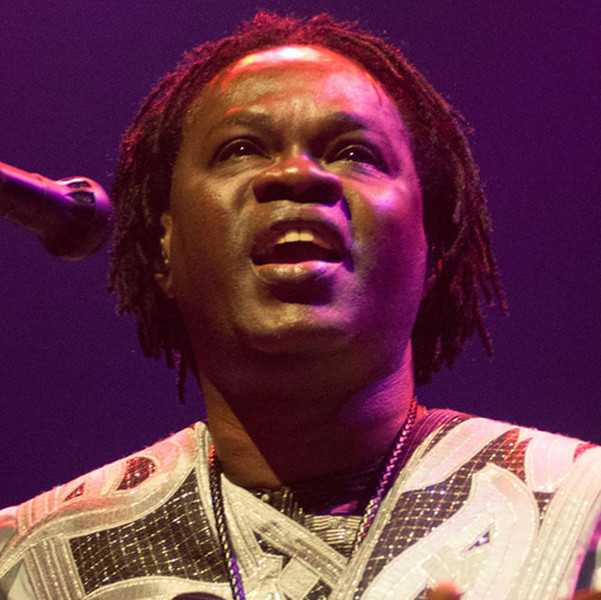 | ||
| Allmusic Biography : A superstar in his native Senegal, spiritual pop singer Baaba Maal was not even born to be a performer -- in West African culture, tradition dictates that the ancient griot caste must produce the singers and storytellers, and Maal was born in the city of Podor in 1953 into the fishermans caste. Despite his parents insistence that he become a lawyer, he grew up surrounded by music, absorbing both the traditional sounds of the region as well as American R&B; and soul, later discovering jazz and blues. As a teen Maal moved to Dakar, joining the 70-piece orchestra Asly Fouta and teaming with his guitarist friend Mansour Seck to form the group Lasli Fouta; during the early 80s, the duo also spent several years in Paris, where they recorded the 1984 album Djam Leelii. Upon returning to Senegal, Maal formed the group Daande Lenol -- literally, "The Voice of the Race" -- and began honing a highly distinctive sound fusing traditional African music with elements of pop and reggae; in 1988 he issued the LP Wango, the first in a series of highly successful albums which also included 1991s Baayo, 1992s Lam Toro, and 1994s Firin in Fouta. In 1998, Maal released Nomad Soul; the first recording on Chris Blackwells new Palm Pictures label, it featured cameos by Brian Eno, Howie B., and others. Jombaajo appeared in 2000, followed by Missing You in 2001 and Television in 2009, all on Palm. Maal took an extended break from recording, he accepted an appointment as a United Nations cultural ambassaador and he copntinued performing. He toured Senegal, Europe, and Asia in intervening years, absorbing many sounds, particularty from the electronic scenes in the U.K. He sought out other musicans, playing with them informally, and took in new technologies and approaches to weave into the fabric of his own unmistakable sound. He was interested in blurring boundaries of Senegalese Fulani folk, global pop and electronic music, in creating a new music that could not "...be put into a box." He renetered the studio in 2015 with producer Johan Hugo from The Very Best. Recording in Londond and Senegal, Maal and Hugo enlisted a wide range of musicans including Winston Marshall from Mumford & Sons. The end result was the album Traveler. It was released by Marathon Artists in January, 2015. | ||
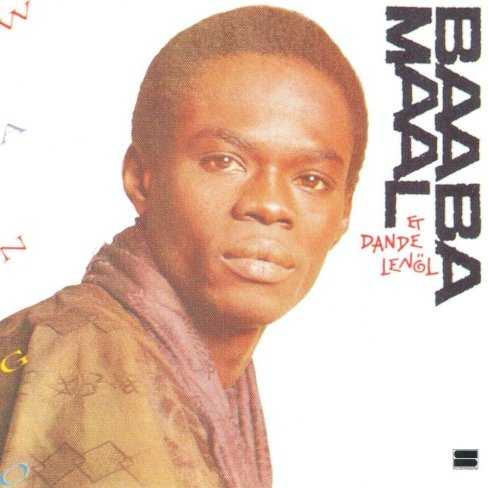 | Album: 1 of 18 Title: Wango Released: 1987 Tracks: 6 Duration: 40:42 Scroll: Up Down Top Bottom 25% 50% 75% Spotify Allmusic AlbumCover | 1 Wango Arti (08:10) 2 Demgalam (07:05) 3 Laam Tooro (07:51) 4 Yiiri Yalla (05:41) 5 Loodo (06:11) 6 Shehil (05:41) |
| Wango : Allmusic album Review : Senegals Maal borrows from reggae, funk, and Tuculeur traditions for his take on international pop. Wango is one of his strongest efforts. | ||
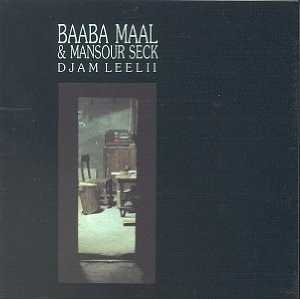 | Album: 2 of 18 Title: Djam Leelii Released: 1989 Tracks: 8 Duration: 48:18 Scroll: Up Down Top Bottom 25% 50% 75% Spotify Allmusic Wikipedia AlbumCover | 1 Lam Tooro (06:41) 2 Loodo (06:10) 3 Muudo Hormo (06:13) 4 Salminanam (04:29) 5 Maacina Tooro (05:49) 6 Djam Leelii (06:02) 7 Bibbe Leydy (06:27) 8 Sehilam (06:24) |
| Djam Leelii : Allmusic album Review : Baaba Maal and Mansour Seck, two of Senegals biggest pop stars, return to their roots (and the roots of the blues, from the sound of it) on this beautifully hypnotic picking session, which also features Djam Leelii. Two guitars, accented by a bit of African percussion and some tasty electric fills by Aziz Dieng, produce pure magic. | ||
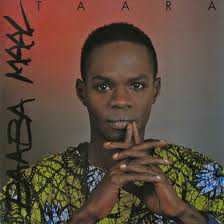 | Album: 3 of 18 Title: Taara Released: 1990-01-01 Tracks: 9 Duration: 54:07 Scroll: Up Down Top Bottom 25% 50% 75% Spotify Allmusic AlbumCover | 1 Sawaly (08:49) 2 Bamba (05:35) 3 Leydi Rimbe (04:54) 4 Dikel (07:02) 5 Taara (05:40) 6 Maayo wadi dyam (04:34) 7 Yiiri yalla (05:42) 8 Loodo (06:11) 9 Sehil (05:37) |
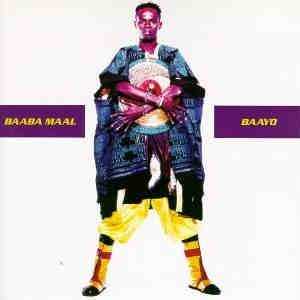 | Album: 4 of 18 Title: Baayo Released: 1991 Tracks: 10 Duration: 59:24 Scroll: Up Down Top Bottom 25% 50% 75% Spotify Allmusic AlbumCover | 1 Baayo (04:28) 2 Mariama (04:56) 3 Joulowo (09:40) 4 Diahowo (06:46) 5 Baaba (03:42) 6 Bouyel (04:15) 7 Yero Mama (04:40) 8 Agouyadi (07:39) 9 Dogata (07:31) 10 Samba (05:43) |
| Baayo : Allmusic album Review : Reissued on Chris Blackwells Palm Pictures label, Baayo is the logical extension of the gorgeous duet recording Baaba Maal did with fellow Senegalese guitarist and singer Mansour Seck, Djam Leelii, issued two years previously. Seck is back here, but this is clearly Maals show. On one hand, he sticks very close to the open, droning whole-tone melodies in traditional Senegalese folk music. On the other, along with Seck and three other guitarists -- who all play in Senegals kora-like style of fingerpicking on nylon strings and alternately keep rhythms by a series of repetitive patterns and interchangeable key signatures in chord patterns for harmonic depth and dimension -- keyboards and programming are added sparely and sparsely in certain places to beef up the percussion a bit and to layer guitars over others as well as create sonic ambience and space. None of it is over the top as it would become on his later records; if fact, its barely noticeable. What is readily apparent is just how stunning Maals voice is, and, when surrounded by a quartet of guitarists, how deeply he can dig in for the purpose of being a griot (storyteller), and to inspire religious faith and national pride in responding to calls to prayer, to provide for families, and to offer inspiration and example to coming generations. These are spiritual songs that reflect the joy and responsibility of a commitment to that way of life. It is quietly awe-inspiring and infectiously optimistic. Whether or not you can relate to the themes in these songs, their passion and sheer musicality will take you over. | ||
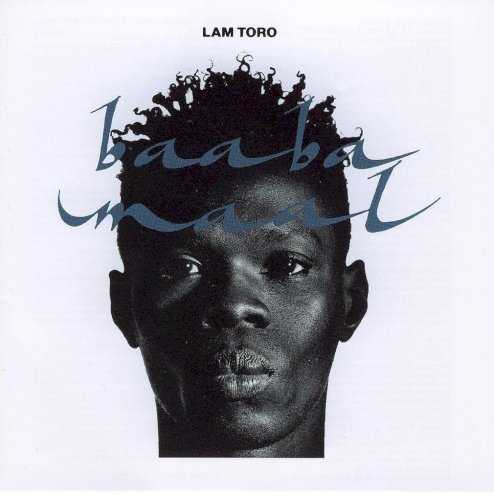 | Album: 5 of 18 Title: Lam Toro Released: 1992 Tracks: 10 Duration: 52:26 Scroll: Up Down Top Bottom 25% 50% 75% Spotify Allmusic AlbumCover | 1 Hamady Boiro (Yelle) (04:31) 2 Daande Lenol (05:42) 3 Lem Gi (07:11) 4 Ndelorel (03:59) 5 Yella (04:36) 6 Toro (02:31) 7 Daniibe (07:57) 8 Olel (05:55) 9 Sy Sawande (05:27) 10 Hamady Bogle (04:32) |
| Lam Toro : Allmusic album Review : This is the album that introduced Baaba Maals singular mix of traditional African rhythms and Western arrangements to the world. His third recording, Lam Toro bounds ahead of his previous two albums (which explored his folk roots), transforming Senegalese music with funky grooves and electrified melodies. | ||
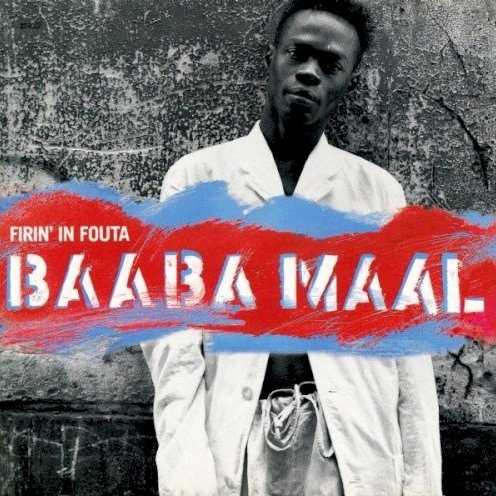 | Album: 6 of 18 Title: Firin In Fouta Released: 1994-10-24 Tracks: 10 Duration: 55:08 Scroll: Up Down Top Bottom 25% 50% 75% Spotify Wikipedia Allmusic AlbumCover | 1 Sidiki (04:53) 2 African Woman (06:05) 3 Swing Yela (04:24) 4 Mbaye (05:01) 5 Njilou (05:30) 6 Gorel (05:28) 7 Sama Duniya (05:19) 8 Salimoun (Funky Kora) (05:02) 9 Ba (07:14) 10 Tiedo (06:08) |
| Firin' In Fouta : Allmusic album Review : Senegalese pop legend-to-be Baaba Maal released Firin in Fouta in 1994. The album starts with a tribute to his bass player (and his family lineage of griots). Following is a tribute to African women that has more than a tinge of Latin thrown in. "Swing Yela" is a piece infused with more than his usual amount of pop, including a small dose of rap. Following songs range in topic from the Muslim faith to the world market to childrens games. The thing that makes Baaba Maal appealing, especially on the Western market, is the way in which he combines seemingly traditional vocal techniques with up to date instrumentation. The keyboards and, more importantly, the drum loops give the songs a deep European club feel along with a strong push in the way of the vocals. Overall, its not a bad album in any way, though it could be attacked by fundamentalists on either side of the range of the album. African traditional music fanatics as well as Parisian clubbers. Conversely, it could easily be embraced by both. For a look into the brightest form of new music in the worldbeat tradition (traditional + western = worldbeat), Firin in Fouta might be a pretty good shot. | ||
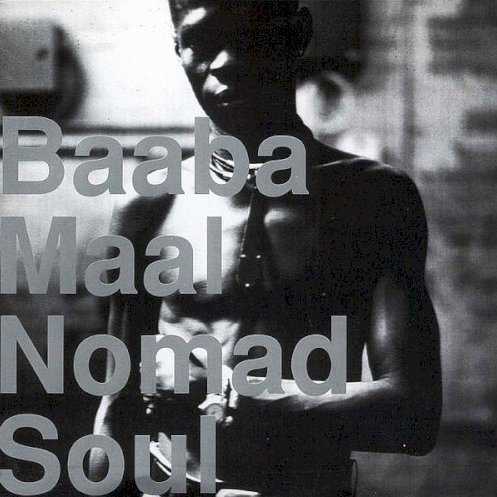 | Album: 7 of 18 Title: Nomad Soul Released: 1998-07-14 Tracks: 11 Duration: 1:07:29 Scroll: Up Down Top Bottom 25% 50% 75% Spotify Allmusic AlbumCover | 1 Souka Nayo (I Will Follow You) (06:26) 2 Africans Unite (Yolela) (03:43) 3 Mbolo (05:47) 4 Cherie (07:09) 5 Fanta (05:01) 6 Guelel (06:15) 7 Douwayra (04:14) 8 Lawa (05:10) 9 Yiriyaro (Percussion Storm) (04:54) 10 Koni (06:28) 11 Lam Lam (12:18) |
| Nomad Soul : Allmusic album Review : Baaba Maals first album for the upstart Palm Pictures label, Nomad Soul goes through all of the usual motions for a Maal album, which is at the same time wonderful and frustrating: frustrating given the extraordinary musical wealth of Senegals traditional forms that is overlooked, but wonderful given the remarkable directions that artists such as Maal have taken with their newer, slicker productions. The basic texture of the album is almost a constant, rarely moving away from a relatively soft vocal track backed by a number of guitars and light percussion. This is music made for the Parisian market in large part, and more broadly the worldbeat market. Soft synths and keyboards exist merrily alongside soft guitars and koras. One exception from the formula on this album is the worthy "Yiriyaro (Percussion Storm)," wherein Maals vocals are backed by a troupe of sabar players (more or less a Senegalese version of a djembe, with a harsh sound from the use of a stick for playing). Fans of Baaba Maal will probably already know and love this album and, more than likely, newcomers to his sound will be just as pleased with this one as with any other. | ||
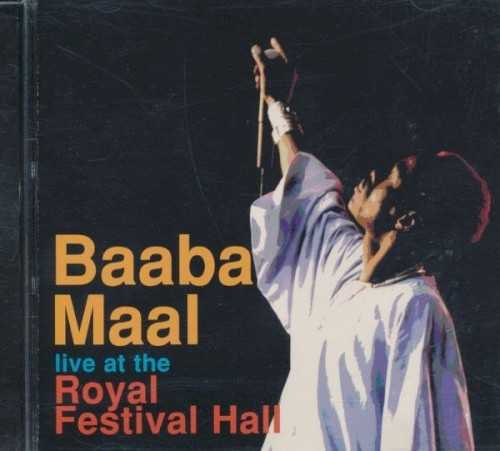 | Album: 8 of 18 Title: Live at the Royal Festival Hall Released: 1999-03-16 Tracks: 4 Duration: 41:29 Scroll: Up Down Top Bottom 25% 50% 75% Spotify Allmusic AlbumCover | 1 Mbolo (08:18) 2 African Woman (11:01) 3 Koni (10:22) 4 Douwayra (11:48) |
| Live at the Royal Festival Hall : Allmusic album Review : Baaba Maal has long been known for his exciting live performances, and this well-recorded live show does a nice job of capturing his energy. Only one of the tunes here clocks in at under ten minutes and little of the time seems wasted, with the large band (with no less than eight percussionists) driving the singer in his remarkable performance. Of particular note is a guest appearance by Ernest Ranglin on the lovely "Koni." | ||
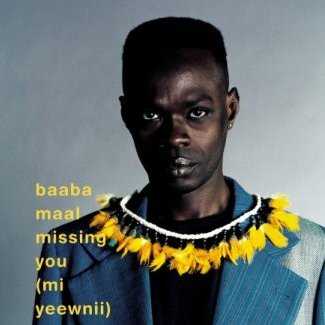 | Album: 9 of 18 Title: Missing You (Mi Yeewnii) Released: 2001-04-02 Tracks: 11 Duration: 53:16 Scroll: Up Down Top Bottom 25% 50% 75% Spotify Allmusic AlbumCover | 1 Yoolelle Maman (04:19) 2 Miyaabele (03:54) 3 Fa Laay Fanaan (04:52) 4 Leydi Ma (03:43) 5 Jamma Jenngii (04:30) 6 Fanta (04:20) 7 Laare Yoo (04:44) 8 Senegale Ngummee (05:03) 9 Mamadi (04:58) 10 Kowoni Maayo (mi Yeewnii) (05:51) 11 Allah Addu Jam (06:56) |
| Missing You (Mi Yeewnii) : Allmusic album Review : As one of Africas most pivotal musicians, Baaba Maal has consistently produced music that challenges cultural expectations as well as political/social consciousness. Since he was not born into the griot caste, the group that traditionally produces music and documents history, Maal oversteps many barriers to create tunes that inspire dancing, thinking, and spiritual connection. Missing You (Mi Yeewnii) represents a pinnacle of sorts. After the commercial success of Firin in Fouta and Nomad Soul, which were albums that presented a seamless blending of modern and traditional cultures, Missing You returns to the natural essence of African music -- the people and land itself. Its an offering that reaches both the modern and traditional worlds without compromise. This CD is a collection of intimate, pure tunes enhanced only by traditional instruments and Maals soaring voice. Recorded in the small village of Nbunk, just outside of Maals native Dakar, the album brims with the nuances of rural African life. Composed on acoustic guitar, the songs range from the throbbing percussion of "Leydi Ma," to the unadorned simplicity of "Miyaabele," a melody indigenous to all of West Africa, which Maal brilliantly uses as a plea for African unity. Boasting balafons, koras, drums, hoddu (African lute), and even crickets, Missing You reflects Maals vision of one Africa, and its a beautiful vision indeed. | ||
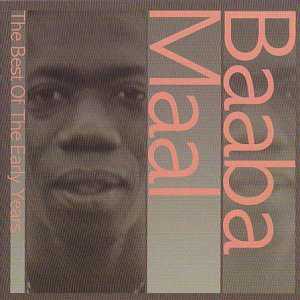 | Album: 10 of 18 Title: The Best of the Early Years Released: 2003-03-24 Tracks: 13 Duration: 1:11:36 Scroll: Up Down Top Bottom 25% 50% 75% Allmusic AlbumCover | 1 Yero Mama (04:43) 2 Wango Arti (08:12) 3 Loodo (06:13) 4 Daande Lenol (05:57) 5 Bouyel (07:54) 6 Baydikacce (06:09) 7 African Woman (03:43) 8 Hamady Boiro (03:41) 9 Sukanaayo (06:58) 10 Toro (03:42) 11 Baaba (04:17) 12 Baayo (04:31) 13 Taara (05:36) |
| The Best of the Early Years : Allmusic album Review : A collection of songs from the first three albums in the career of the Senegalese star Baaba Maal. Essentially whats presented here are tracks from Wango, Baayo, and Lam Toro: the days with his Dande Lenol group. The music lays the foundations for his later work, in his vocal style and the accompaniment ideas. Its these songs that formed the basis for Maals ascent to stardom, as he showed off the new end of the worldbeat movement in the Paris-Dakar connection. His nasal vocals formed a counterpoint to the ever-present bass, and the mix of electronic and traditional instruments would be heavily capitalized upon in future years. With someone of Maals stature and talent, the first recommendation would of course be to pick up the three albums that this compilation is culled from, so as to get the album tracks as well as the singles. For an introduction into the early years of his sound though, this single album goes a long way. Pick it up as a replacement for the first half of Maals catalog on a budget. | ||
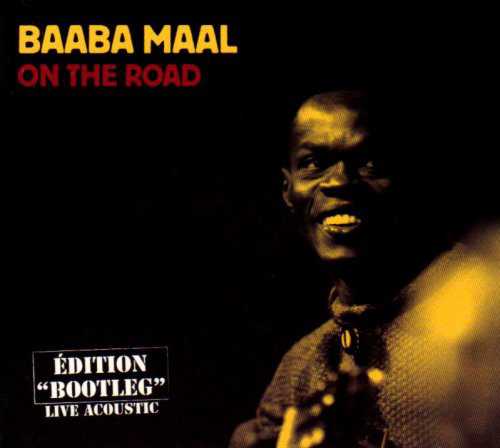 | Album: 11 of 18 Title: On the Road (Edition "Bootleg") (Live Acoustic) Released: 2008 Tracks: 8 Duration: 1:01:04 Scroll: Up Down Top Bottom 25% 50% 75% Spotify AlbumCover | 1 Baayo (05:41) 2 Fanta (05:51) 3 Farba (08:09) 4 Iyango (07:30) 5 Koni (feat. Ernest Ranglin) (09:20) 6 Africans Unite (Yolela) (08:13) 7 Cherie (06:57) 8 Bamba (09:19) |
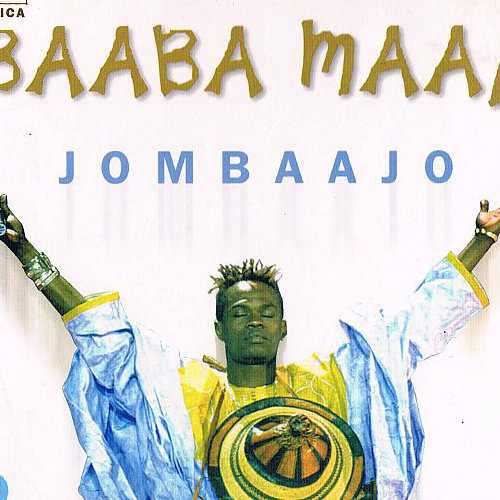 | Album: 12 of 18 Title: Jombaajo Released: 2008-01-29 Tracks: 10 Duration: 59:48 Scroll: Up Down Top Bottom 25% 50% 75% Spotify Allmusic AlbumCover | 1 Suka Naayo (06:57) 2 Demn Galam (06:31) 3 Baydikacce (07:54) 4 Jombaajo (07:32) 5 Miyahata (06:24) 6 Sakambewdo (04:24) 7 Thiaroye (05:00) 8 Farba (04:48) 9 Laguiya (05:19) 10 Ngawla (04:55) |
| Jombaajo : Allmusic album Review : The music of an artists formative years can be revealing in terms of influences and background. But in most cases the outtakes from early work remains unreleased for a very good reason -- a lack of quality. However, Jombaajo proves thats not the case for Baaba Maal. Recorded during the sessions for his debut disc, there seems to be no reason these never appeared. Theyre fresh-faced, raw, and eager -- but passion is a good thing in music. Yes, there are touches of African reggae, mbalax, and many popular African styles, indicating hed yet to completely find his own voice, but all the elements were already in place. Simply listen to "Baydikacce," for example, where the reggae canter of the opening explodes into soukous as good as anything that came from the Congo in the 80s, with Maal in complete control throughout. And sometimes simpler is better, as with "Suka Naayo," which appeared in a vastly embellished version on Nomad Soul. Here its stripped to the bone, lean and sinewy, and decidedly hungry -- a much better version. Recorded in 1986, its a fascinating, and very worthwhile, look at a star in the making. | ||
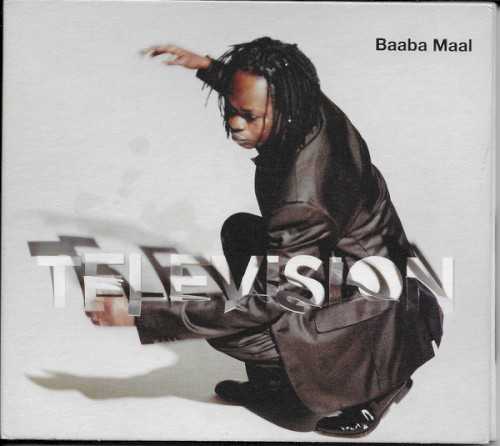 | Album: 13 of 18 Title: Television Released: 2009-06-01 Tracks: 8 Duration: 42:47 Scroll: Up Down Top Bottom 25% 50% 75% Spotify Allmusic AlbumCover | 1 Television (07:07) 2 Tindo (04:16) 3 Miracle (04:02) 4 Cantaloupe (06:07) 5 A Song for Women (06:23) 6 International (04:29) 7 Dakar Moon (03:15) 8 Tindo Quando (07:04) |
| Television : Allmusic album Review : On Television, Baaba Maal collaborates with Didi Gutman and Sabina Sciubba of New Yorks Brazilian Girls to fashion an album that combines subtle electronica with his own kind of Senegalese pop. The album took three years to record, and one track, the softly percolating dance tune "International," appeared the previous year on the Brazilian Girls CD New York City. The tune is club-friendly, with Maal delivering an unusually subdued vocal. The mix here is shorter and lacks the dub-like effects the Brazilian Girls dropped between verses on New York City. The album opens with the title track, a Maal/Brazilian Girls collaboration. A muted guitar figure that sounds like a music box floats below a funky samba-like beat. The African percussion embroiders the mix without overwhelming the bouncy club pulse. "Tindo" blends a drum loop, talking drum, and electric bass to propel the subtle intertwining vocals of Maal and Sciubba. "Miracle" sounds like South African jive. Long sustained electric guitar notes introduce this lilting, happy dance tune and Maal and Sciubba turn in a playful duet that skims across the glittering surface of the music. "Cantaloupe" was written by Maal, Gutman, and Barry Reynolds, the guitar player with the legendary Compass Point studio band. The melody has the Latin/Caribbean feel typical of American 30s movie musicals, while Maal contributes a traditional Senegalese vocal. A programmed rhythm track starts about midway through, to add a modern element to another laid-back track. Maal and Sciubba co-wrote "A Song for Women," a tune praising the power of African women, and its another surprisingly mellow effort. Maals vocals float in and out of the mix in a dub-like manner; hand percussion accents the songs drum loop without overwhelming its steady thrum. The album closes with two simmering acoustic tracks. "Dakar Moon," sung by Maal partially in English, has a vague Caribbean lilt that recalls the Cuban hotel music of the islands pre-revolutionary past. Sounds of nature -- the wind in palm trees, the shushing of the tide -- fill the background with Barry Reynolds adding some flamenco-flavored guitar. "Tindo Quando," another take on "Tindo," features Maals acoustic guitar and a subtle balafon supporting the vocals of Maal and Sciubba. Sciubba sings a counter-melody in Italian to complement Maals Fonyi vocal. Both singers hold back to show off the softer, melodic side of their vocal prowess. | ||
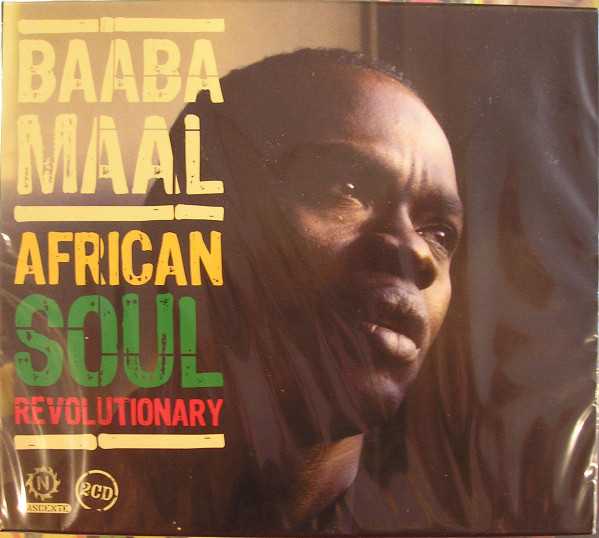 | Album: 14 of 18 Title: African Soul Revolutionary Released: 2010-09-20 Tracks: 23 Duration: 1:09:22 Scroll: Up Down Top Bottom 25% 50% 75% AlbumCover | 1 Farba (04:47) 2 Laguiya (05:16) 3 Thiaroye (04:57) 4 Baydikacce (07:53) 5 Jombaajo (07:29) 6 Sakam Bewdo (04:23) 7 Ngawla (04:54) 8 Miyahata (06:20) 9 Demga Lam (06:28) 10 Suka naayo (06:56) 11 Tabakaly (feat. Mansour Seck) (09:54) 1 Wango arti (?) 2 Demgalam (?) 3 Laam Tooro (?) 4 Yiiri Yalla (?) 5 Loodo (?) 6 Sehil (?) 7 Sawaly (?) 8 Bamba (?) 9 Taara (?) 10 Maayo Wadi Dyam (?) 11 Dikel (?) 12 Leydi Rimbe (?) |
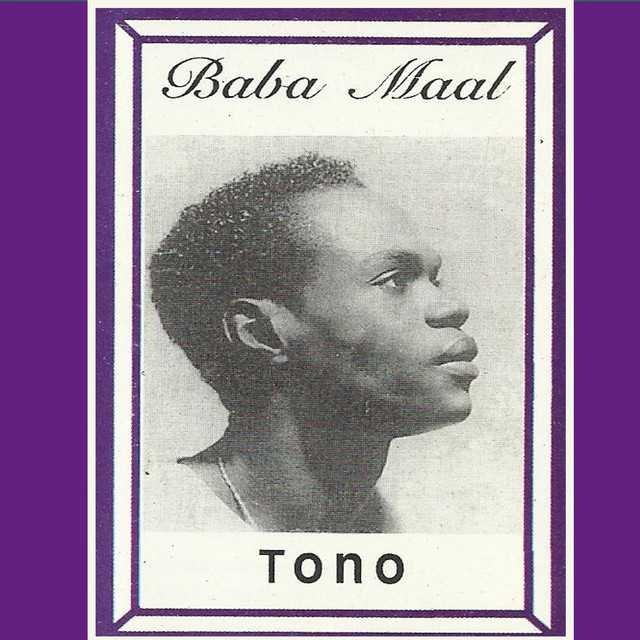 | Album: 15 of 18 Title: Tono Released: 2013-09-02 Tracks: 7 Duration: 46:00 Scroll: Up Down Top Bottom 25% 50% 75% Spotify AlbumCover | 1 Tono (09:14) 2 Njillou (05:41) 3 Fanta (07:14) 4 Jamma Jenngi (03:16) 5 Haayoo Mi Dagni (06:48) 6 Wara (07:14) 7 Ndakarou (06:31) |
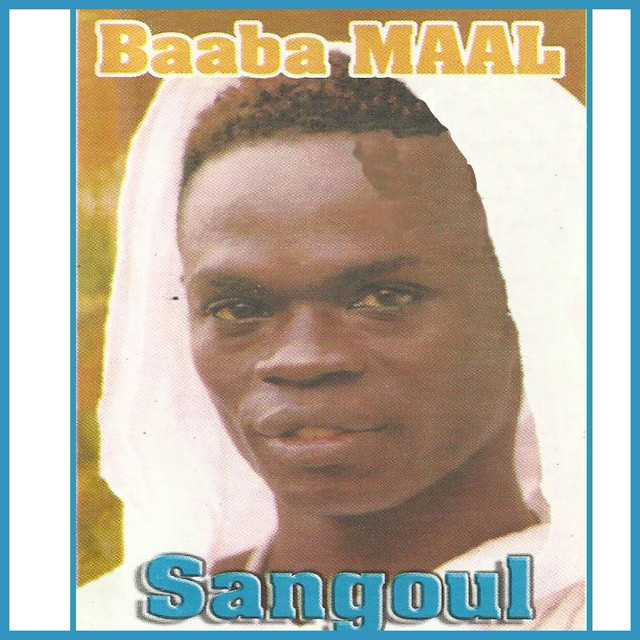 | Album: 16 of 18 Title: Sangoul Released: 2013-09-11 Tracks: 6 Duration: 42:40 Scroll: Up Down Top Bottom 25% 50% 75% Spotify AlbumCover | 1 Sangoul (06:16) 2 Mbaye Sy (06:57) 3 Yinkili (06:18) 4 Tono (08:16) 5 Thiayo (06:17) 6 Diaralé (08:34) |
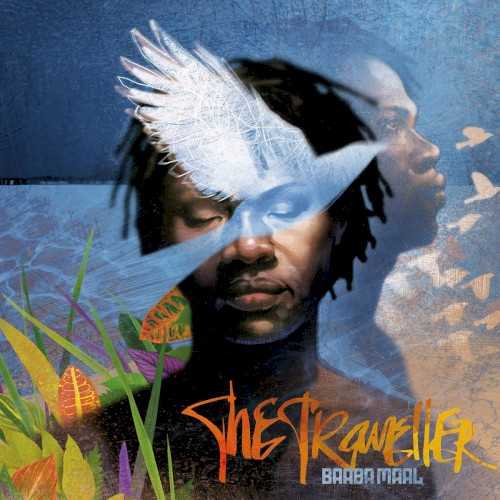 | Album: 17 of 18 Title: The Traveller Released: 2015 Tracks: 9 Duration: 41:10 Scroll: Up Down Top Bottom 25% 50% 75% Spotify Allmusic AlbumCover | 1 Fulani Rock (04:44) 2 Gilli Men (04:59) 3 One Day (03:56) 4 Kalaajo (04:34) 5 Lampenda (03:45) 6 Traveller (04:07) 7 Jam Jam (04:28) 8 War (04:10) 9 Peace (06:25) |
| The Traveller : Allmusic album Review : Senegalese singer, songwriter, and guitarist Baaba Maal hasnt recorded an album in six years, but he hasnt been idle. Hes run an annual music festival, Blues du Fleuve, in his hometown of Podor in northern Senegal since 2006, and performed widely with the international unit Playing for Change. Hes also been soaking up modern sounds. The Traveller, his 11th album, is drenched in electronic sounds that complement his meld of Senegalese folk and pop and offer the fruit of his journeys. It was produced by Johan Hugo (the Very Best), and recorded in Dakar and London. The Maal/Hugo collaboration first surfaced in March of 2014 with the raw dancefloor bubbler "Suma Rokia." The Traveller is simultaneously more polished and rootsier. Not (entirely) focused on the club, it leaves room for more of Maals traditional sound even as it lets the electro flow. Opener "Fulani Rock" cooks. Mamadou Sarrs djembes thunder amid sonic vocal treatments by Hugo (AutoTune among them) as dirty, distorted guitars crisscross, creating a furious collision of rhythms that are momentarily interrupted by a martial chant in the bridge. Its followed by "Gilli Men." The acoustic guitars of Maal and Kalifa Baldi offer circular interplay amid loops and kalimbas. Maals trance-like singing is supported by the Dakar Church Choir. Other cuts, such as "One Day," recall Maals earlier work, but the layers of reverb, digital delay, and spiky electric guitars deliver compelling layers of texture and color. "Lampenda" commences as a simple Fulani folk song underscored by Maal and Baldis gorgeous guitar playing (they should tour as a duo) and a church organ. But as multiple sabar drums enter the mix (by Bahkane Seck & Family), Hugo stirs in sweeping strings and keyboards, transforming it into a pop anthem -- and celebrates fishermen! The title track features an appearance by Mumford & Sons Winston Marshall on banjo. Initially it resembles a Malian blues, playing behind multi-tracked backing vocals. But it quickly shifts into a gentle road song with a glorious four-voice male and female backing chorus adding the notion of celebration. There are big beats driving it all, but theyre reined in by the canny, eclipsing interplay between Maal and Baldi. The final two cuts, co-written with author Lemn Sissay -- who speaks them in English -- are "War" and "Peace." Maal plays guitar and sings in the backdrop. The former is an urgent, drum-driven call to reject the perils of nationalism; the latter is a prayer for the healing of people and the Earth. Its peul flute, kora, guitars, and organic percussion add an emotional resonance to the lyric. Maals embrace of technology on The Traveller isnt new: hes been open to it since 2009s Television; its simply more pervasive here. Nonetheless, he has found a way to use it as a simple extension of his iconic sound. In these songs Maal continues to celebrate his people, his culture, and the Fulani language, even as he presents the listener with challenges to their preservation from inside and outside Senegal. | ||
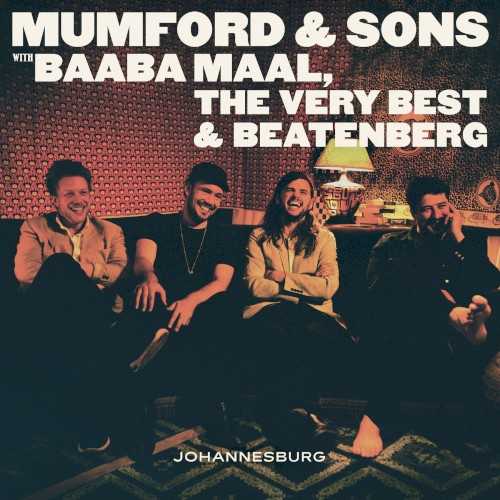 | Album: 18 of 18 Title: Johannesburg Released: 2016-06-17 Tracks: 5 Duration: 20:36 Scroll: Up Down Top Bottom 25% 50% 75% Allmusic AlbumCover | 1 There Will Be Time (04:28) 2 Wona (04:00) 3 Fool You’ve Landed (03:41) 4 Ngamila (03:37) 5 Si tu veux (04:48) |